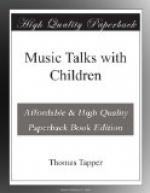12: If the original is desired, see Tyndall’s “Glaciers of the Alps.”
13: Schumann wrote in a letter to Ferdinand Hiller,
“We should learn
to refine the inner ear.”
14: From the sermon entitled “The Seriousness of Life.”
15: Notice sometime how many of our English words
have the Latin
con.
16: See the fourth chapter of Reuben Post Halleck’s
“Psychology and
Psychic Culture.”
17: For instance, the subject of the C minor
Fugue in the first book
of “The Well-tempered
Clavicord.”
18: The subject of the C sharp minor Fugue.
19: The prelude in E flat minor and the subject
of the G sharp minor
Fugue.
20: Robert Schumann.
21: Quoted by Xenophon in the “Memorabilia,”
Book II, Chapter I, Bohn
edition.
22: “Heroes and Hero Worship,” Lecture I.
23: From the sermon entitled “Backgrounds and Foregrounds.”
24: I should again suggest the value of letting
the children become
familiar with such books as
J.H. Parker’s “A B C of Gothic
Architecture;” and of
having always about plenty of photographs of
great buildings, great men,
great works of art and of famous
places for them to see and
to know ("letting them become
familiar,” remember).
25: See R.P. Halleck’s “Psychology and Psychic Culture.”
26: Read paragraphs 41 and 42 of John Ruskin’s
“Athena Chalinitis,”
the first lecture of “Queen
of the Air.”
27: John Ruskin, from the lecture entitled “Franchise,”
in “Val
d’Arno,” par.
206.
28: “Letters of Felix Mendelssohn Bartholdy
from Italy and
Switzerland.” Letter
of July 15, 1831.
29: “Letter of December 19, 1831.”
30: Read also what is said of Chopin on p. 28.
31: Read to the children “The Wonderful
Weaver” in “Old Greek
Stories,” by James Baldwin.
It is only a few pages in length, and
is well told.
32: Robert Schumann.
33: John Ruskin’s “Queen of the Air,”
par. 102. ("Athena Ergane.”)
Read all of it to the children.
34: Idem.
35: Lord Bacon, from the essay “Of Great Places.”
36: Robert Schumann.
37: Read John Ruskin’s “Sesame and
the Lilies,” par. 19, and as much
of what follows as you deem
wise.
38: “The Ethics,” Book IX, Chapter VII.
39: Always I have it in mind that the teacher
will read or make
reference to the original
when the source is so obvious as in this
case. The teacher’s,
or mother’s, discretion should, however,
decide what and how much of
such original should be read, and what
it is best to say of it.
40: I have not attempted to quote the exact words usually given.
41: Socrates. This quotation is from the
“Memorabilia of Xenophon,”
Book I, Chapter VI.




